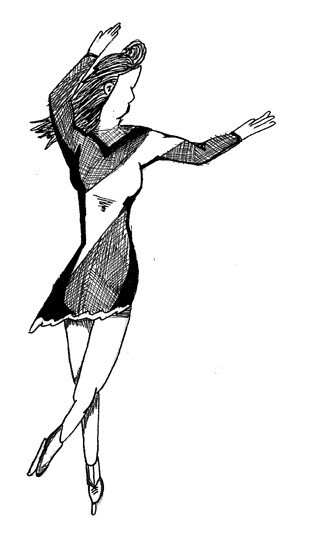Figure skating still getting an icy reception
What factors make or break the legitimacy of a sport?
Sit down with a piece of paper and a pencil, and try to write out a definition of the word “sport.” It’s not all that easy, is it?
As common as sports are in our daily lives, it’s difficult for the average person to say exactly what a sport is. I bet you would have worn out that pencil if I’d asked you to write what it’s not.
According to the Random House Dictionary, a sport is “an athletic activity requiring skill or physical prowess and often of a competitive nature.”
If you’ve ever seen a figure skating competition, you can’t say the activities are completely devoid of skill or physical prowess, and, well, it was a competition you were watching.
And by Yahoo! Sports columnist Dan Wetzel’s own admission, “figure skaters are not just athletes, but remarkable athletes.”
To sum up: Athletic activity, check. Skill, check. Physical prowess, check. Competitive nature, check.
So why did Wetzel’s quote come from a screed titled “Why figure skating is not a sport?” Let’s look.
First, he claims that a sport “needs a quantifiable way to determine a winner and a loser.”
It is true that scoring in figure skating is largely based on the opinions of individual judges. But who besides Wetzel is saying that an unquestionable scoring system is essential to credibility as a sport? Or is that just his opinion rearing its head?
Wetzel then declares, “An ugly person would stand at a considerable, if not insurmountable, disadvantage in skating.”
Never mind that physical beauty is even more opinion-based than figure skating scores.
But Wetzel continues, “Ugly people can win in track, in skiing, in the NFL, in soccer. Beauty doesn’t matter. Style doesn’t matter.”
Does the emphasis on style in figure skating make it less of a sport? Or maybe it makes it more of one by adding an extra criterion for the athletes to keep in mind. You decide.
To illustrate this point, Wetzel cites the attack on Nancy Kerrigan in 1994, stating that it was due to Tonya Harding’s jealousy over Kerrigan being “taller, prettier, more graceful” than Harding, even though she was supposedly “better at all aspects of skating than Kerrigan.”
However, Harding’s skating career peaked in 1991; she was placing third to Kerrigan’s first in the 1993 U.S. Championships, and eighth to her second in the Olympics the following year. So perhaps Harding was jealous because Kerrigan was actually landing her jumps.
Considering that Harding has never confessed to conspiring to attack Kerrigan, there is no proof of her motivation.
Still not convinced? I challenge you to enter a figure skating competition yourself. After all, it can’t be that hard to put on a glittery outfit and jump around on the ice for a few minutes. Then come back to me with your sprained ankles, bruised elbows, and ice-scraped palms and tell me it’s not a sport.
Published in Volume 63, Number 24 of The Uniter (March 19, 2009)







